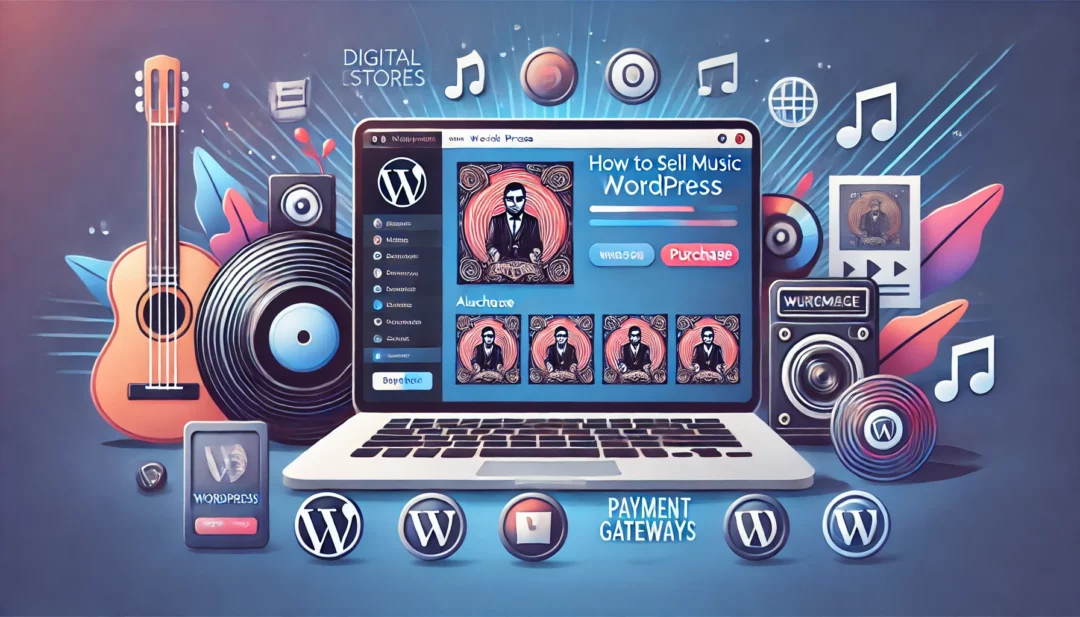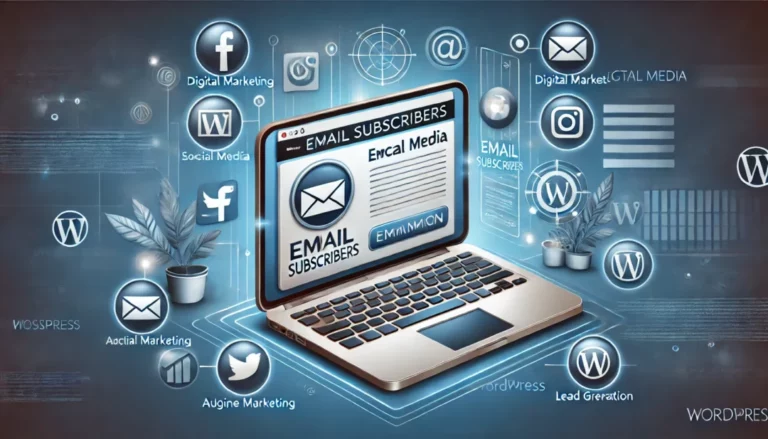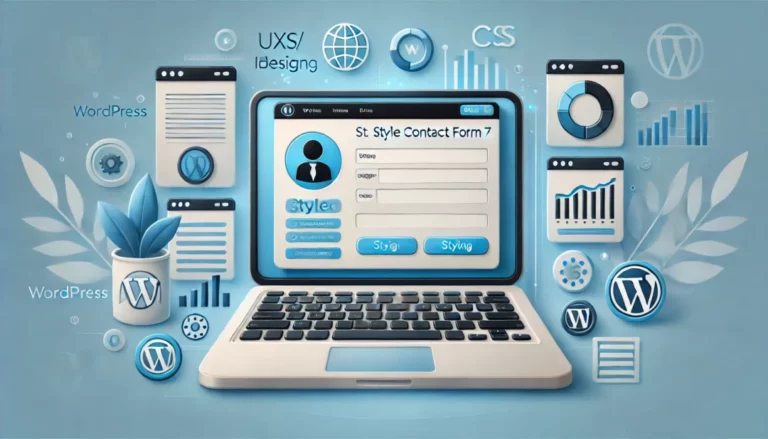
Selling your music online has never been easier, and WordPress is the perfect platform to make it happen. Whether you’re an independent artist or part of a band, creating a digital storefront for your music allows you to reach fans worldwide and generate income directly. With the right tools and strategies, you can turn your WordPress site into a professional music-selling hub.
You’ll start by setting up a WordPress website, choosing a theme that complements your brand, and installing essential plugins for e-commerce. From there, you’ll upload your tracks, organize them into albums or singles, and set pricing. Finally, you’ll optimize your site for user experience and promote your music to drive sales. It’s a straightforward process that gives you full control over your music and profits.
Why Sell Music Online With WordPress
WordPress offers a flexible platform for selling music online, combining ease of use with powerful customization. Whether you’re an independent artist or part of a band, it gives you full control over your website and music sales.
- Customizable Design Options
WordPress allows you to create a professional website tailored to your brand. With thousands of themes like Astra and OceanWP, you can design your site to reflect your artistic identity, enhancing user experience and engagement.
- Integration With E-Commerce Plugins
WordPress supports plugins like WooCommerce and Easy Digital Downloads, making it simple to list, sell, and manage digital music files. These tools streamline payment processing, inventory management, and customer tracking.
- Direct-to-Fan Sales
Selling music through WordPress eliminates intermediaries, so you can retain a higher percentage of sales. By offering music as direct downloads or through subscriptions, you build stronger connections with your audience.
- SEO and Marketing Tools
WordPress includes built-in SEO functionality and supports plugins like Yoast SEO to increase your site’s visibility. By optimizing product pages, generating blog content, and managing metadata, you attract more listeners organically.
- Ownership of Assets
Unlike third-party platforms, WordPress lets you own your content and control how it’s presented. You decide pricing strategies, promotional offers, and distribution without interference.
WordPress combines creative freedom with robust monetization tools, making it a preferred choice for artists seeking online music sales.
Setting Up Your WordPress Site
Creating your WordPress site is the foundation for selling music online. Follow these steps to establish a professional and functional platform.
Choosing A Domain And Hosting Provider
Select a domain name that reflects your artist or band identity. Use platforms like Namecheap or Google Domains to check availability. Prioritize short, memorable names, using your brand or music style for inspiration. For example, “YourBandName.com” works well.
Pick a reliable hosting provider to ensure fast load times and minimal downtime. Providers like Bluehost, SiteGround, or WP Engine offer plans tailored to WordPress users. Look for features like one-click WordPress installation, SSL certificates for secure transactions, and scalable options to grow with your music business.
Selecting The Best WordPress Theme For Music Sales
Choose a WordPress theme optimized for musicians and music sales. Look for themes like Sonaar or Music Pro that include features such as music players, event calendars, and WooCommerce compatibility.
Filter themes by responsiveness to ensure mobile-friendly design. Confirm customization options for branding, including font and color settings. Free themes provide basic features, while premium options offer advanced tools like bundled plugins and dedicated support, enhancing your site’s user experience.
Installing Essential Plugins
Install plugins to enable key functionalities for music sales. Use WooCommerce or Easy Digital Downloads for managing digital music products. Add AudioIgniter to create customizable playlists or music players embedded on your site.
Optimize for search engines using Yoast SEO for meta tags and readability analysis. Install Mailchimp for building email subscriber lists or MonsterInsights for tracking visitor behavior. Ensure plugins remain updated to maintain compatibility and security.
Creating Your Online Music Store
Building an online music store allows you to sell your music directly to fans while maintaining control over pricing, content, and distribution. WordPress provides the flexibility and tools you need to create, manage, and optimize your store.
Adding A Payment Gateway
Integrating a payment gateway enables secure transactions on your site. Install an e-commerce plugin like WooCommerce or Easy Digital Downloads, which supports multiple gateways. Go to the plugin settings, and select options like PayPal, Stripe, or Square to accept payments. Configure your chosen gateway by entering required details such as API keys or account credentials.
Customize the payment process for convenience. Enable credit/debit cards, digital wallets, or bank transfers to offer multiple methods. Test the gateway to ensure smooth transactions before going live.
Setting Up Digital Downloads
Facilitating digital downloads ensures customers can quickly access your music. Upload your files to your WordPress media library or use cloud storage platforms like AWS or Dropbox. In your e-commerce plugin, navigate to the products section and create new entries for individual tracks, albums, or bundles.
Attach downloadable files to each product. Enable download limits or expiration dates to protect your content. Clearly label each product with high-quality descriptions, pricing, and formats like MP3 or FLAC. Include sample previews to entice purchases.
Organizing Your Music Catalog
A structured catalog helps users find your music quickly. Create categories such as albums, singles, or genres. Within your e-commerce plugin, assign products to appropriate categories and tags. For example, use tags like “Pop,” “Live Recording,” or “Exclusive Tracks.”
Enhance navigation with filters and search functionality. Install plugins like Faceted Search or SearchWP to improve user experience. Design a visually engaging layout, adding album art, tracklists, and descriptions to each product page. Optimize your catalog pages using SEO techniques such as keyword-rich headings and meta descriptions.
Optimizing Your Store For Sales
Optimizing your music store in WordPress enhances user experience and increases sales. Focusing on product descriptions, audio previews, and SEO strategies improves store performance.
Writing Compelling Product Descriptions
Craft product descriptions that highlight your music’s value. Use clear language to describe the genre, mood, and themes of your tracks or albums. Include relevant keywords like “indie rock single” or “acoustic instrumental album.” Detail unique features, such as exclusive mixes or bonus tracks, to entice buyers.
Maintain an engaging style by addressing your audience directly. For example, write “Discover this uplifting jazz piano track, perfect for relaxing evenings,” instead of generic descriptions. Use bullet points for technical details like file format (MP3, WAV) and track length to ensure clarity.
Using High-Quality Audio Previews
Include high-quality audio previews to help customers make purchasing decisions. Upload 30-60 second clips showcasing the most appealing sections of your tracks. Use an audio plugin like AudioIgniter or Compact WP Audio Player to enable smooth playback.
Ensure previews are optimized for quick loading to prevent user frustration. Compress audio files while retaining sound quality, and avoid watermarks that detract from the listening experience. Keep volume levels consistent across all previews to maintain professionalism.
Incorporating SEO Strategies
Enhance your music store’s visibility by applying SEO techniques. Optimize product pages with descriptive titles, using keywords like “buy pop album online” or “digital EDM track download.” Add meta descriptions summarizing your music succinctly to attract search engine users.
Use alt text for product images with relevant keywords, such as “cover art for electronic dance track.” Improve internal linking by connecting product pages to your blog posts or genre-specific categories. Install SEO plugins like Yoast SEO to analyze content and improve rankings.
Marketing Your Music Store
Marketing helps you boost visibility and increase sales for your music store. Use targeted strategies to grow your audience and create long-term engagement.
Leveraging Social Media
Social media platforms like Instagram, Facebook, and Twitter provide direct channels to connect with your audience. Share engaging content such as behind-the-scenes videos, album teasers, or live performance clips to promote your music and drive traffic to your store.
Utilize platform-specific features, like Instagram Reels or TikTok challenges, to create viral content. Consider posting regularly, using hashtags relevant to your genre, and engaging with followers through comments or direct messages.
Running paid ad campaigns on social platforms targets specific demographics based on location, age, or interests, helping you reach potential customers effectively. Include links to your WordPress store in posts or bios to streamline the user journey.
Building An Email List
Email marketing is a powerful tool to connect directly with listeners interested in your music. Add a subscription form to your WordPress store using plugins like Mailchimp or Constant Contact to collect email addresses.
Share exclusive updates, new releases, or discount codes through newsletters. Personalize emails with the subscriber’s name and segment your list by preferences, like genre or favorite albums, for higher engagement.
Use a lead magnet, such as a free track download or early access to new releases, to encourage signups. Ensure your email campaigns have clear calls-to-action linking back to your music store.
Running Promotions Or Discounts
Offering promotions or discounts incentivizes purchases, particularly during new releases or holidays. Create limited-time offers, like 10% off or buy-one-get-one-free on albums or tracks, to drive urgency and boost sales.
Use plugins like WooCommerce Smart Coupons to set up and manage discount codes seamlessly in your WordPress store. Highlight these offers on your homepage, product pages, or through pop-up notifications.
Promote sales events across email campaigns and social media to maximize reach. Show countdown timers or exclusive access to loyal customers to enhance the effectiveness of your promotions.
Conclusion
Selling your music online with WordPress empowers you to take full control of your creative and financial journey. With its customizable features, powerful plugins, and marketing tools, you can build a professional store that reflects your brand while connecting directly with your audience. By combining the right tools and strategies, you’re not just selling music—you’re creating a platform that supports your growth as an artist. Take the first step today and make your music accessible to fans worldwide.
Frequently Asked Questions
1. Why is WordPress a good platform for selling music online?
WordPress is ideal for selling music online due to its flexibility, customization options, and wide range of e-commerce plugins like WooCommerce and Easy Digital Downloads. It allows artists to control pricing, branding, and distribution while offering built-in SEO tools to enhance visibility and attract listeners.
2. What plugins are essential for setting up a music store on WordPress?
Key plugins include WooCommerce or Easy Digital Downloads for managing sales, AudioIgniter for music playback, and Yoast SEO for optimizing search rankings. These plugins add functionality and make it easier to sell music directly to fans.
3. How do I upload and sell my music on a WordPress website?
You can upload your music as digital files, create product entries with descriptions and pricing, and organize them into albums or singles using WooCommerce or Easy Digital Downloads. You’ll also need a secure payment gateway for transactions.
4. How can I optimize my music store for SEO?
Optimize product pages with descriptive titles, use relevant keywords in meta descriptions, and add alt text to images. Additionally, improve internal linking, and include high-quality audio previews to engage visitors and boost rankings.
5. What are the benefits of selling music directly to fans?
Selling directly allows you to retain a larger share of profits, build a closer relationship with your audience, and maintain full control over your content, pricing, and promotion strategies without relying on third-party platforms.
6. How do I choose the right WordPress theme for my music website?
Pick a music-focused theme with features like built-in audio players, event calendars, and customizable layouts. Popular options include Astra, Neve, or themes specifically designed for musicians and bands.
7. What payment methods can I offer on my WordPress music store?
You can integrate a variety of payment gateways, such as PayPal, Stripe, or credit card options, using plugins like WooCommerce or Easy Digital Downloads. Customize the payment process to ensure a seamless user experience.
8. How do I promote my music store to attract more customers?
Leverage social media platforms to share engaging content and run targeted ads. Use email marketing tools like Mailchimp to keep fans updated. Offering discounts or special promotions also helps drive traffic and sales.
9. Can I include previews of my songs on my WordPress store?
Yes, you can use plugins like AudioIgniter to add easy-to-use audio players for song previews. Ensure audio previews are high-quality, load quickly, and have consistent volume levels for the best user experience.
10. Why is owning my music website better than using third-party platforms?
Owning your website gives you full control over your music, branding, pricing, and fan interactions. You can avoid platform fees, keep more profits, and ensure your music is showcased exactly how you want it to be.



